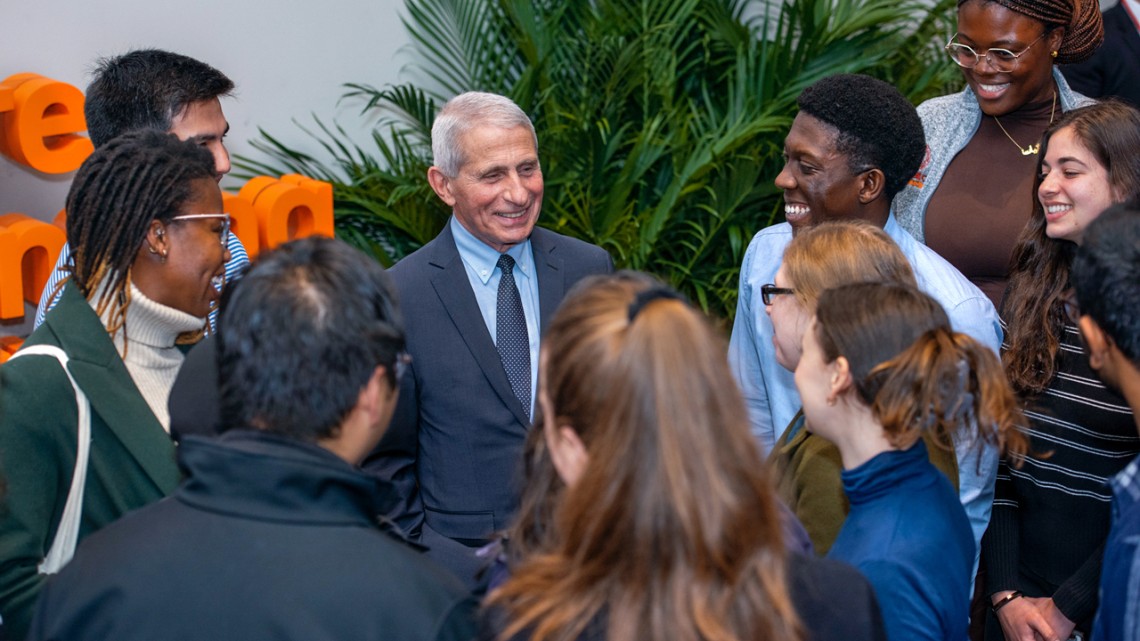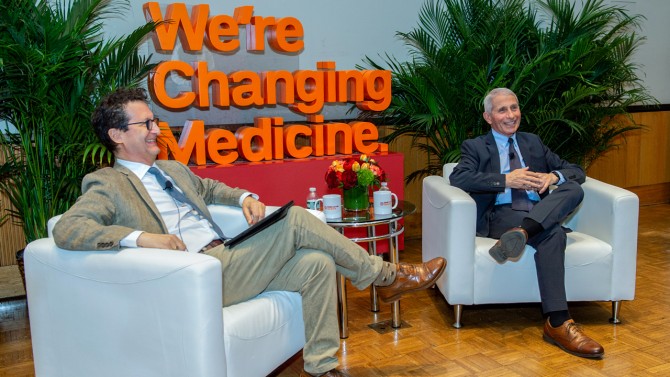
Weill Cornell Medicine students, alumni and faculty greet Dr. Anthony Fauci following the screening of “American Masters: Dr. Tony Fauci” on March 13 in Uris Auditorium.
Fauci returns to Weill Cornell Medicine for documentary screening
By Brian Mastroianni
The summer before he started medical school, Dr. Anthony Fauci, M.D. ’66, worked on the construction crew that built the Samuel J. Wood Library at Weill Cornell Medicine.
While on his lunch break, Fauci entered the building, looked down from the top of the library stairs and said to himself, “Oh my God, one of these days I’m going to be in this institution.” And so he was, first as student and later as chief medical resident at NewYork-Presbyterian/Weill Cornell Medical Center. That experience led him to an unparalleled career spanning medicine and public service.
Fauci discussed these experiences March 13 at Weill Cornell Medicine’s Uris Auditorium before fellow alumni, current fourth-year medical students and faculty during a pre-premiere screening of “American Masters: Dr. Tony Fauci.” The documentary, which will debut nationwide on PBS March 21, illustrates the full scope of his career set against the backdrop of his final years of service presiding over the nation’s response to the COVID-19 pandemic.
Following the screening, Fauci – who will also appear via Zoom at a College of Arts and Sciences “Arts Unplugged” event on March 29 – was joined by the film’s director and producer Mark Mannucci for a Q&A featuring audience questions. For Fauci, it offered an opportunity to reflect on his achievements as the nation’s leading public health voice and his current mission to inspire the next generation of physicians and medical innovators.
Fauci said he’s worn “three hats” over the course of a 54-year career. These include developing therapies “for unusual diseases,” working to better understand and treat HIV and, lastly, what he thinks is one of his most enduring achievements: spearheading the creation of the U.S. President’s Emergency Plan for AIDS Relief (PEPFAR), the largest commitment by any nation to address a single disease in history.
This initiative “probably had the most broad impact when President George W. Bush told me to go to Africa and put together the program that would be both transforming and accountable for treatment prevention and care for persons living with HIV,” Fauci said. “In fact, we just had our celebration with former President George W. Bush about just three weeks ago, and celebrated the 20th anniversary; that program resulted in the saving of 25 million lives.”
Throughout the film, Fauci describes on how his work has often taken place at the intersection of traditional medicine and policy. He’s served under seven presidential administrations, finding himself at the center of the nation’s response to what are two of the defining public health issues of our times, the HIV/AIDS crisis and the COVID-19 pandemic.
Mannucci spent two and a half years filming Fauci, following him as he navigated the constantly shifting dynamics of both the coronavirus itself and a presidential transition that saw him serve most recently as current President Joe Biden’s chief medical adviser.
Fauci said as his time in public service came to a close, he considered his purpose moving forward. The decision to step away from the government clarified what he is supposed to do next.
“I’ve had 54 years, 38 years as director [of NIAID]. I’ve written a lot of papers, done a lot of things,” Fauci said, when asked what was going through his mind in stepping down from government service. “Do I need to write another paper? Do we need to do another clinical trial? Or maybe there is something else that would be important and something else to me became crystal clear – to inspire younger people who are either in science or who are thinking about going into science, to get enthusiastic about it, or consider a career in public health or possibly even in public service.”
Fauci embodies the ultimate role model for a career in public service, said Dr. Francis Lee, interim dean of Weill Cornell Medicine. “As a member of the Weill Cornell Medical College Class of 1966,” he said, “Dr. Anthony Fauci represents the excellence this institution strives for in the next generation of medical and scientist leaders.”
Fauci also reminisced about his time as a medical student. He lived in Olin Hall and was part of a graduating class that included four women.
He recalled a class assembly in Uris Auditorium during his last year of medical school. A recruiting officer reminded the men that as graduating doctors, they all were drafted into the Vietnam War and would have to select service in either the Army, Air Force, Navy or in public health. Fauci wanted to pursue infectious diseases, so he selected public health – a choice that led him to the National Institutes of Health and an unexpected career in clinical research and public service.
“Expect the unexpected and keep a completely open mind about what possibilities arise for you,” Fauci advised current fourth-year medical students. “It’s great to plan, but sometimes things get thrown in front of you that are so irresistible that you really have to do it.
“I was bitten by the bug of discovery,” he added, “and I figured it is possible to combine discovery with still seeing patients, and I found it. That’s what I’ve done for the past 50 years, so keep an open mind, and keep your antennas up for opportunity that might change the direction you are going in and pick something that you are passionate about, because it’s hard work. It isn’t the easiest thing in the world – there’s ups and downs and if you aren’t passionate about it you are not going to enjoy it.”
Brian Mastroianni is a freelance writer for Weill Cornell Medicine.
Media Contact
Get Cornell news delivered right to your inbox.
Subscribe

